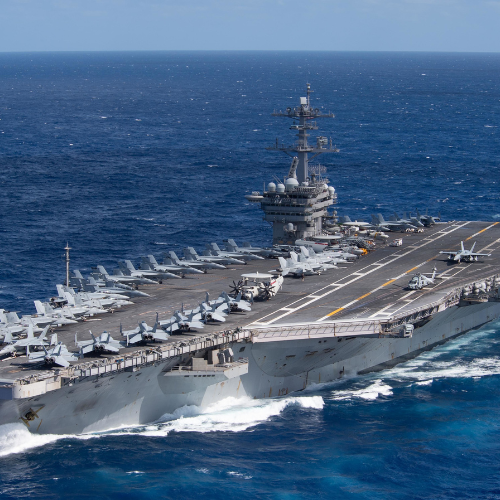In a significant security incident, police in Busan are looking into the actions of three Chinese students who are accused of taking unauthorized photographs of a U.S. aircraft carrier. The incident, which occurred on June 25, 2024, highlights the stringent security measures and regulations surrounding military installations in Busan. The case highlights both the sensitivity of military operations and the potential international ramifications of such actions.
Details of the Incident
The three students, one of whom is a man in his 40s, were detained for flying a drone near the Naval Operations Command (NOC) in Busan. The drone was reportedly used to capture unauthorized images of the USS Theodore Roosevelt (CVN 71), a nuclear-powered aircraft carrier docked at the Busan Naval Base. This visit was part of a high-profile trilateral naval exercise involving South Korea, the United States, and Japan, aimed at enhancing the interoperability and readiness of the allied forces.
The USS Theodore Roosevelt’s visit to Busan was a strategic milestone, highlighting a crucial moment in regional military collaboration. The carrier’s presence was not just a display of naval power but also a symbol of the strong military ties between the participating nations. The unauthorized photographs taken by the students potentially compromised the security of this operation, raising concerns about the protection of sensitive military assets.
Leticia Zheng Exposed in Sinister 7-Year Chinese Espionage Operation at the University of Florida
Legal Implications
The Enforcement Decree of the Protection of Military Bases and Installations Act governs the protection of military facilities in South Korea. Under this regulation, unauthorized photography of military bases and their operations is strictly prohibited. The law is designed to prevent the dissemination of sensitive information that could be exploited for intelligence purposes or other malicious activities.
For those found to be in violation of this decree, penalties can be severe. Individuals convicted of photographing military installations without authorization could face up to three years in prison or a fine of up to 30 million won (approximately $21,660). These stringent measures are in place to safeguard national security and ensure the integrity of military operations.
Shocking Espionage Scandal: Former Verizon Employee Ping Li Spied for China
Significance of the USS Theodore Roosevelt Visit
The timing of the incident is particularly significant. On the same day that the students allegedly captured unauthorized images, South Korean President Yoon Suk Yeol visited the USS Theodore Roosevelt’s flight deck for an inspection. This high-profile visit added a layer of sensitivity to the situation, as the presence of the president further elevated the security concerns associated with the carrier’s visit.
Venture Capitalists Under Siege: US Tech Companies Face Chinese Espionage Threats
The USS Theodore Roosevelt, a key component of Carrier Strike Group 9, is an essential asset within the U.S. Navy’s operational fleet. Its deployment to Busan was part of a broader strategic exercise intended to demonstrate the united front of South Korea, the United States, and Japan in addressing regional security challenges. The unauthorized photography could have provided insights into the carrier’s operational capabilities, making the security breach even more concerning.
Busan’s Strategic Role
Busan, South Korea’s major port city, holds strategic importance for the nation’s defense and international military collaborations. The Busan Naval Base is a critical location for naval operations and serves as a key hub for international military exercises. The detection of the students’ drone near such a sensitive facility highlights the ongoing security challenges faced by military and defense agencies in the region.
Lee Jong-Ho’s Explosive Role: 3 Key Revelations in South Korea’s Scandal
Military bases in Busan are subject to rigorous security protocols to prevent unauthorized access and protect sensitive information. The enforcement of these regulations is vital to maintaining the integrity of military operations and ensuring the safety of personnel and assets.
Broader Implications for Regional Diplomacy
The incident involving the Chinese students has broader implications for regional diplomacy and security. The presence of the USS Theodore Roosevelt and the associated trilateral naval exercise were significant demonstrations of military cooperation among South Korea, the United States, and Japan. The involvement of Chinese nationals in this case could complicate diplomatic relations, particularly in the context of ongoing regional security issues and military collaborations.
Ri Il-kyu’s Defection: Sinister Mission to Sabotage South Korea-Cuba Relations Ended
The case highlights the delicate balance of international relations and the importance of maintaining robust security measures. As South Korea navigates its role in regional security partnerships, incidents like this serve as reminders of the need for vigilance and adherence to security regulations.



